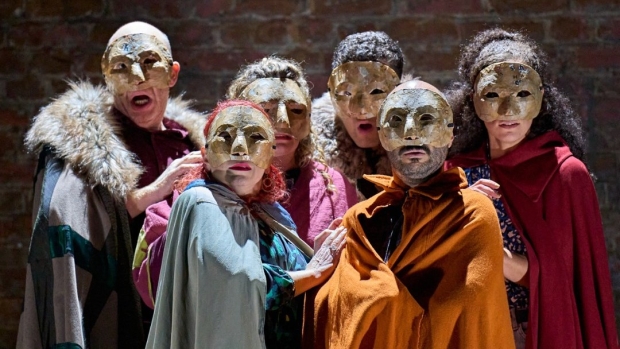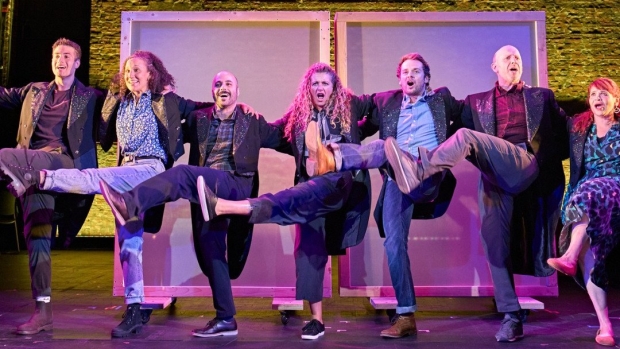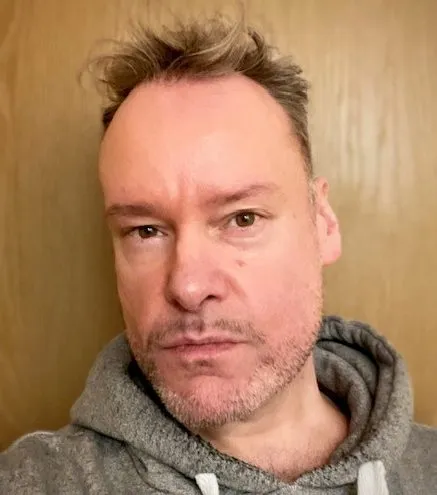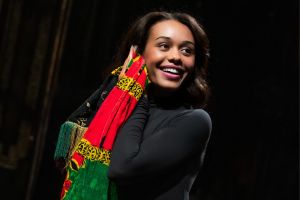”Jews. In Their Own Words” at the Royal Court – review

© Manuel Harlan
Jews. In Their Own Words is a much more enjoyable piece of theatre than that, but it’s still a hot mess. It begins jokily with the fictional Fink conversing with the disembodied voice of God, marvelling how such an apparently liberal and progressive institution as the Court could have displayed such cultural insensitivity. This opening is quite funny (Alex Waldmann as Fink does a lovely line in detached bafflement) but it also feels self-referentially smug (“so this is the Promised Land?” asks Fink, “not exactly” rejoinders God, “it’s the Royal Court”). What follows is a well meaning, absorbing but somewhat ponderous 100 minutes assembled from interviews conducted with a dozen people over the last year or so, talking about their Jewishness both from a secular point of view and in terms of faith, also their family histories, the prejudice they have encountered, and how their collective past shapes their relationships to the present and future.
It’s meticulously staged in parts and brilliantly performed, but repeatedly begs the question “who is this actually for?” However interesting much of it is, very little of the information here will come as news to Jewish people while anybody who is idiotic enough to be antisemitic is hardly going to come and have their minds expanded by a show with a title like this.
Of the 12 people interviewed, a number of them – including actress Tracy-Ann Oberman, who had the original idea for this piece, Booker Prize-winning author Howard Jacobson, Margaret Hodge MP, journalist Stephen Bush, and former MP Luciana Berger who was instrumental in exposing the antisemitism in Corbyn’s Labour Party – have been in the public eye and accordingly their opinions, trials and achievements are already pretty well documented. That’s not to say that their words aren’t stimulating and affecting here: you’d have to have a hard heart not to be moved by Hodge’s story of her grandmother, murdered by the Nazis, repeatedly writing to her exiled son “don’t forget me completely”, or to be utterly repulsed by some of the misogynist obscenity meted out on social media to Hodge, Oberman and Berger. Debbie Chazen (Margaret Hodge) and Louisa Clein (both Oberman and Berger) deliver finely tuned but powerful accounts of these remarkable women.

© Manuel Harlan
The humanity throughout is compelling but the only thing that comes close to being revelatory is the unsettling realisation that antisemitic prejudice exists in quarters of society that generally pride themselves on being unimpeachably inclusive, intelligent and progressive. There’s humour, some of it wonderful (Steve Furst as a gruffly matter-of-fact London based decorator is particularly engaging), some of it not (a running joke about Jacobson’s Booker Prize really outstays its welcome), but, sadly, almost no acknowledgement of the rich cultural heritage the Jewish community has lent to humanity down the centuries.
As if aware of a paucity of authentic dramatic tension, directors Vicky Featherstone and Audrey Sheffield have created a multi-media staging that vacillates between frantic and static, with projections, batteries of moving lights, endlessly sliding walls all jockeying for attention with the fine actors; it’s busy and predominantly slick, but has some real headscratcher moments. There’s a dire Music Hall-style song and dance number, “The Jews Did It”, that is neither savage nor polished enough, and a truly bizarre moment where, when the trope of the avaricious Jew is talked about with reference to Shakespearean drama, an actor in a giant, very detailed, Shylock headpiece wobbles on then off again to little theatrical purpose. The use of commedia dell’arte style masks and mime to illustrate Jewish history is also quite shoddily done. The actors are all superb though, never hitting a false note when delivering the real-life words of the 12 chosen figures, and adroitly changing stance and vocal timbre to indicate transitioning to a different character.
Ultimately, the project feels like an extravagant attempt by the Royal Court, as an institution, to make amends for past mistakes and micro-aggressions. Caryl Churchill’s divisive Seven Jewish Children which played here in 2009 and was decried by several influential figures as an anti-Israel blood libel, is referenced at one point, although, tellingly, Jim Allen’s Perdition, which was deemed too controversial (for “controversial” read historically inaccurate and antisemitic) to even make it to first preview at the Theatre Upstairs in 1987, is not. Some seriously magnificent talent is involved, but ultimately the twin objectives of being boldly iconoclastic and not wanting to offend anybody make uneasy bedfellows. Nonetheless, I suspect Jews. In Their Own Words will get a whole lot more people talking.












